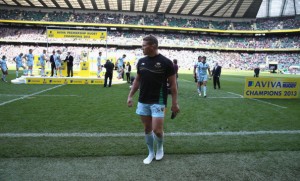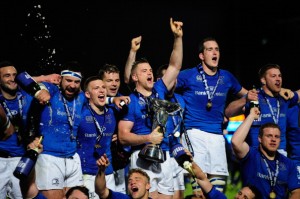
Captain's call: Dean Mumm poses for the snappers after being unveiled as the new captain for the Exeter Chiefs
By Alan Dymock
CAPTAINS SAY a lot about your team. You can pick the biggest name in your squad or you can pick the old-stager who has been there, done it, torn the t-shirt off and moaned about a life spent wearing tracksuits. Whoever it is, though, normally tells you about the values and direction of a side.
Already this off-season big clubs have announced changes to their leadership structure. Dean Mumm, the Australian lock, has been picked as the man to lead Aviva Premiership side Exeter Chiefs through their next season. Peter O’Mahony has replaced ever-present Paul O’Connell as the leader for Munster, at the ripe old age of 24. For London Irish who will hope to stave off relegation from the Premiership once again, they have picked last year’s stand out performer George Skivington to take on the role full-time.
The question of who other clubs keep backing and replace is an interesting one. Keeping a captain can suggest a club is happy where they are or what their values are. Dylan Hartley will remain as Northampton Saints skipper, so obviously the club appreciate what he does for their image and chances of winning. Yet change can suggest a desire to become something else. Of course, sometimes a name is picked because there are simply no other candidates.
Some teams must be considering whether to stick or twist. For example, London Wasps have lost one of their leaders in Marco Wentzel, but keep Hugo Southwell. Does Southwell remain in his role overlooking a young and exciting squad?
Sale Sharks, on the other hand, have lost several personnel. They pride themselves on their grit, so despite the challenges they will face this season, do they keep David Seymour in to spearhead their approach? It is a similar question that faces Llanelli Scarlets. Rob McCusker was captain last term, and with big names like Matthew Ress, George North, Andrew Fenby and Tavis Knoyle moving in and only one well-known player coming in, in the form of John Barclay, perhaps they have no option but to stick.
With clubs like Edinburgh and Glasgow Warriors, too, there seems almost no reason at all to change their leadership structures.
The fans will have no real say in this matter. It comes down to a coach’s discretion. If they like a player or that person has done the job through every tough game in recent memory it is hard to stick. Sometimes the coaches do not have time for sentimentality. Look at Leinster. A new coach comes in, Matt O’Connor. He has long-serving leader Leo Cullen with him and behind that Brian O’Driscoll who is set for one more year. Does he stick with what was there before him? It is difficult, because it is well known that Cullen will blow himself to bits for the cause – it has been overheard before that it will be a miracle if the second row can walk when he is in his 50s – but in the RaboDirect Pro12 final the skipper insisted on lifting the cup in tandem with Jamie Heaslip.
O’Connor could do worse than to facilitate a changing of the guard that is already underway. Some changes just make sense. Another example would be if Rob Webber took over as captain of Bath. Few would grumble.
Mind you, there are the instances where there is no evolution or revolution; there is just necessity.
With Jim Hamilton now at Montpellier, Gloucester need a captain. If Mike Tindall and Hamilton have been unable to play, 24-year-old Tom Savage has stepped into the breach. He may be the man that DoR Nigel Davies wants, with few others shooting their hands up, but how can you know. There are so many young talents there, anyone in the creche could get the golden rattle.








